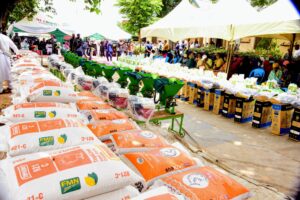The Federal Capital Territory (FCT), has distributed agricultural inputs as grants, to 9,170 beneficiaries, under the FCT Fadama CARES
By Philip Yatai
The Federal Capital Territory (FCT), has distributed agricultural inputs as grants, to 9,170 beneficiaries, under the FCT Fadama CARES programme, within one year of President Bola Tinubu-led administration.
The FCT Minister of State, Dr Mariya Mahmoud, disclosed this while inaugurating the distribution of the grant to the fourth batch of 6,020 beneficiaries in Gwagwalada on Thursday.
The News Agency of Nigeria (NAN) reports that some of the inputs distributed included fertilisers, seeds, agrochemicals, sprayers and personal protective equipment for crop farmers.
Also distributed were day old chicks and feeds to poultry farmers; juvenile fish and feeds for fish farmers; goats for livestock farmers and grinding machines for women agriculture products processors.
Mahmoud explained that 3,150 farmers had benefited in the third phase in December 2023, to support dry season farming, bringing the total number of beneficiaries to 9,170 in one year.
This, according to her, represents a 216 per cent achievement when compared with the disbursement of the grant to 4,233 beneficiaries in about two years, prior to Tinubu administration.
She said that the FCT Fadama CARES programme, under the Work Bank-supported Nigeria COVID-19 Action Recovery and Economic Stimulus (NG-CARES), was designed to increase food security and safe functioning of the food supply chain in the FCT.
“The programme is deliberately designed to support the recovery of livelihood activities of poor and vulnerable persons engaged in agricultural value chains, with special consideration to women and unemployed youths.
“Its implementation will be anchored on the World Bank community driven development approach for deployment of programme investments at the community level,” she said.
The minister described the programme as a significant indicator of the unflinching commitment of President Tinubu, towards ensuring sustainable food production through his administration’s Renewed Hope Agenda.
She added that the FCT Minister, Mr Nyesom Wike-led FCT Administration, had committed significant resources towards ensuring sustainable agriculture production in line with the vision of Tinubu.
This, according to her, is a panacea for poverty reduction and improvement of livelihoods for poor and vulnerable agricultural households in the FCT, through the FCT Fadama CARES programme.
“This, indeed, is a clear indication of our administration’s commitment towards ensuring sustainable agricultural production for the attainment of food and nutritional security, poverty reduction and improved livelihoods.”
Mahmoud also disclosed that the FCTA Agriculture and Rural Development Secretariat was leveraging the Fadama CARES programme to provide starter packs to 94 trainees of FCT – Leventis Foundation School of Agriculture, Yaba, for years 2022 and 2023.
“This is part of the youth empowerment component of the Fadama CARES programme, to enable the trainees to put into practice what they studied in school,” she explained.
On his part, Mr Lawan Geidam, the Mandate Secretary, Agriculture and Rural Development Secretariat, explained that the 6,020 beneficiaries, under the fourth batch, were selected from 82 farming community associations across the six area councils of the FCT.
Geidam identified the inputs disbursed within the year as 12,436 bags of NPK and 6218 bags of Urea fertiliser, 18,654 litres of agro chemicals, and 43,526 kg of assorted seeds, under Disbursement Linked Indicator (DLI) 2.1.
Other inputs, he said, included 55,400 day old chicks, 7,756 bags of poultry feed, 81,800 juvenile (catfish) fish and 2,045 bags of fish feed.
He further identified the inputs disbursed under DLI 2.3, as 3690 goats, 3,212 sets of farm assets, such as sprayers, personal protective equipment, and water pumps and accessories.
Others, according to him, are 1006 grinding machines and 22 units of 2MT/hour multipurpose threshers, while water and sanitation facilities have been provided in 10 wet markets across the six area councils. (NAN)




